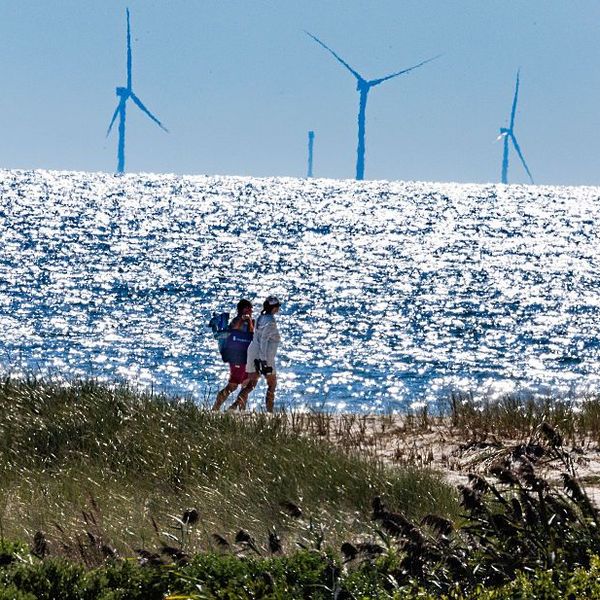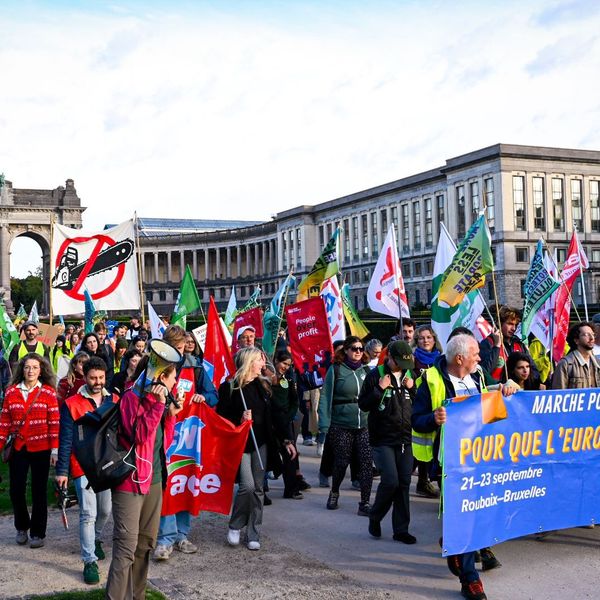Shell Lobbied to Thwart EU Renewable Energy Targets: Guardian
Documents obtained by British paper show energy company lobbied EU executive body head to pursue gas-friendly climate pact
A climate change pact reached by EU leaders last year followed several years of successful lobbying by oil giant Shell "to undermine European renewable energy targets," the Guardian has reported.
The agreement for 2030 goals, which include a 40 percent reduction in greenhouse gases and 27 percent renewable energy in the EU as a whole, was reached in October. It was denounced by environmental organizations who charged that it fell far short of what is necessary to address the climate crisis.
But it was touted by then-European Commission President Jose Manuel Barroso, who called the pact "very good news for our fight against climate change" and said that "No player in the world is as ambitious as the EU."
According to documents obtained by the British daily, Barroso was the target of Shell's lobbying efforts, which focused on the expansion of gas as a greenhouse gas reducing measure rather than renewables. Shell urged him
to scrap the bloc's existing formula for linking carbon-cutting goals with binding renewable energy laws.
Shell argued that a market-led strategy of gas expansion would save Europe EUR500bn (PS358bn) in its transition to a low carbon energy system, compared to an approach centred on renewables. "Gas is good for Europe, and Europe is good at gas," the firm's upstream executive director, Malcolm Brinded wrote in a five-page letter to Barroso.
The paper also reports that the UK had not been "an advocate of EU-wide renewable energy target," and that the UK stance had weight, as it held a leadership role in reaching EU consensus on the targets for the pact.
Brook Riley, climate justice and energy campaigner for Friends of the Earth Europe, said in October, "This deal does nothing to end Europe's dependency on fossil fuels or to speed up our transition to a clean energy future. It's a deal that puts dirty industry interests ahead of citizens and the planet."
An Urgent Message From Our Co-Founder
Dear Common Dreams reader, The U.S. is on a fast track to authoritarianism like nothing I've ever seen. Meanwhile, corporate news outlets are utterly capitulating to Trump, twisting their coverage to avoid drawing his ire while lining up to stuff cash in his pockets. That's why I believe that Common Dreams is doing the best and most consequential reporting that we've ever done. Our small but mighty team is a progressive reporting powerhouse, covering the news every day that the corporate media never will. Our mission has always been simple: To inform. To inspire. And to ignite change for the common good. Now here's the key piece that I want all our readers to understand: None of this would be possible without your financial support. That's not just some fundraising cliche. It's the absolute and literal truth. We don't accept corporate advertising and never will. We don't have a paywall because we don't think people should be blocked from critical news based on their ability to pay. Everything we do is funded by the donations of readers like you. Will you donate now to help power the nonprofit, independent reporting of Common Dreams? Thank you for being a vital member of our community. Together, we can keep independent journalism alive when it’s needed most. - Craig Brown, Co-founder |
A climate change pact reached by EU leaders last year followed several years of successful lobbying by oil giant Shell "to undermine European renewable energy targets," the Guardian has reported.
The agreement for 2030 goals, which include a 40 percent reduction in greenhouse gases and 27 percent renewable energy in the EU as a whole, was reached in October. It was denounced by environmental organizations who charged that it fell far short of what is necessary to address the climate crisis.
But it was touted by then-European Commission President Jose Manuel Barroso, who called the pact "very good news for our fight against climate change" and said that "No player in the world is as ambitious as the EU."
According to documents obtained by the British daily, Barroso was the target of Shell's lobbying efforts, which focused on the expansion of gas as a greenhouse gas reducing measure rather than renewables. Shell urged him
to scrap the bloc's existing formula for linking carbon-cutting goals with binding renewable energy laws.
Shell argued that a market-led strategy of gas expansion would save Europe EUR500bn (PS358bn) in its transition to a low carbon energy system, compared to an approach centred on renewables. "Gas is good for Europe, and Europe is good at gas," the firm's upstream executive director, Malcolm Brinded wrote in a five-page letter to Barroso.
The paper also reports that the UK had not been "an advocate of EU-wide renewable energy target," and that the UK stance had weight, as it held a leadership role in reaching EU consensus on the targets for the pact.
Brook Riley, climate justice and energy campaigner for Friends of the Earth Europe, said in October, "This deal does nothing to end Europe's dependency on fossil fuels or to speed up our transition to a clean energy future. It's a deal that puts dirty industry interests ahead of citizens and the planet."
A climate change pact reached by EU leaders last year followed several years of successful lobbying by oil giant Shell "to undermine European renewable energy targets," the Guardian has reported.
The agreement for 2030 goals, which include a 40 percent reduction in greenhouse gases and 27 percent renewable energy in the EU as a whole, was reached in October. It was denounced by environmental organizations who charged that it fell far short of what is necessary to address the climate crisis.
But it was touted by then-European Commission President Jose Manuel Barroso, who called the pact "very good news for our fight against climate change" and said that "No player in the world is as ambitious as the EU."
According to documents obtained by the British daily, Barroso was the target of Shell's lobbying efforts, which focused on the expansion of gas as a greenhouse gas reducing measure rather than renewables. Shell urged him
to scrap the bloc's existing formula for linking carbon-cutting goals with binding renewable energy laws.
Shell argued that a market-led strategy of gas expansion would save Europe EUR500bn (PS358bn) in its transition to a low carbon energy system, compared to an approach centred on renewables. "Gas is good for Europe, and Europe is good at gas," the firm's upstream executive director, Malcolm Brinded wrote in a five-page letter to Barroso.
The paper also reports that the UK had not been "an advocate of EU-wide renewable energy target," and that the UK stance had weight, as it held a leadership role in reaching EU consensus on the targets for the pact.
Brook Riley, climate justice and energy campaigner for Friends of the Earth Europe, said in October, "This deal does nothing to end Europe's dependency on fossil fuels or to speed up our transition to a clean energy future. It's a deal that puts dirty industry interests ahead of citizens and the planet."

